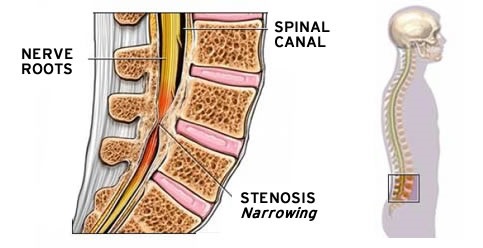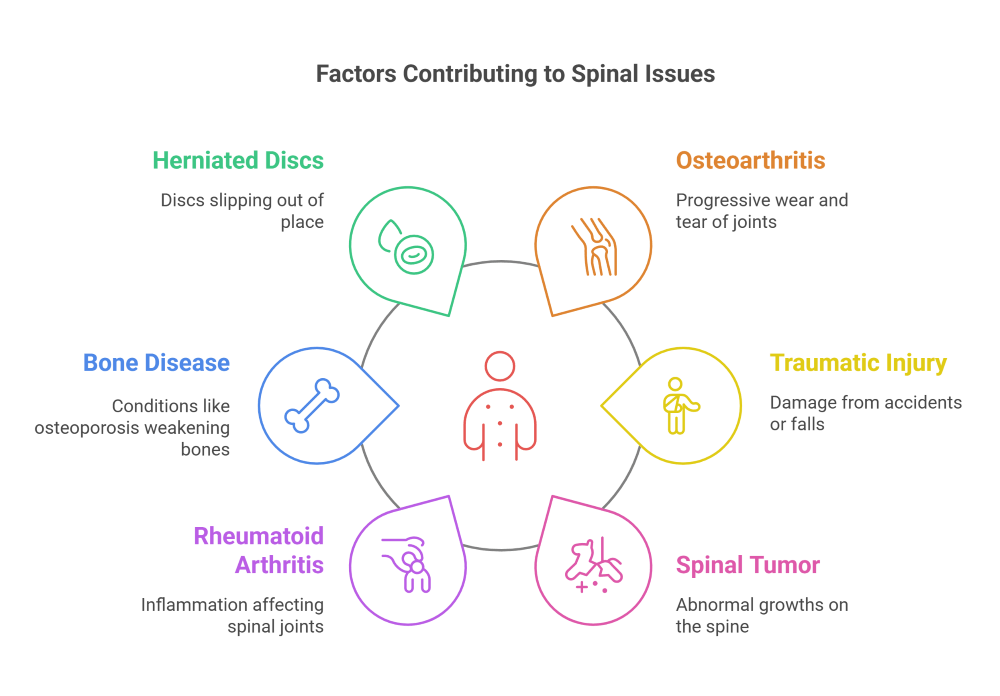Lumbar Spinal Stenosis affects the five vertebrae present in the low back. Early signs include weakness, numbness, pain down the legs, and balance problems. Its debilitating pain can disrupt your quality of life, limit community participation, and limit ADL’s. At Specialized Physical Therapy, we treat lumbar spinal stenosis through personalized care and research-backed solutions.
Lumbar Spinal Stenosis Overview
Lumbar spine stenosis is a degenerative disorder that affects the low back (i.e. the region is located between the pelvis and ribs) after your bones begin to deteriorate. It causes the spinal canal to become narrow, which can lead to compressed nerves and lumbar degeneration. Common causes include osteoarthritis, spinal injury, bone spurs, etc.
With time, spinal discs become hardened and less spongy, often protruding from their position. People experiencing this issue might notice a slight change in gait and have trouble walking.
Other lumbar spinal stenosis symptoms include pain, numbness, and a tingling sensation in the affected area. These symptoms might originate from the low back, but they often spread towards your legs and buttocks.
Our lumbar stenosis treatment offers significant pain relief and support to patients. In addition, you will learn stretching and strengthening exercises to restore lost flexibility and range of motion.

Lumbar Spinal Stenosis Symptoms
During the initial phase, patients may observe mild to no symptoms. With time, the condition can worsen, leading to visible signs of distress.
Common lumbar spinal stenosis symptoms include:
- Low back pain or leg pain
- Numbness or tingling sensation in the affected area
- Weakness and fatigue
- Muscle cramping
- Unsteady gait and balance
- Foot drop (i.e. when the foot slaps down when you walk instead of staying steady)
Untreated spinal stenosis may progress into gastrointestinal issues (like bowel and bladder problems). In addition, it causes mobility issues and affects your range of motion in both your legs and back.
Causes of Lumbar Spinal Stenosis
People over 50 are most likely to develop lumbar stenosis. There are various reasons for this spinal disorder, such as:
- Progressive wear and tear due to osteoarthritis
- Traumatic spinal injury
- Spinal tumor
- Rheumatoid arthritis
- Bone disease
- Herniated discs
- Spinal ligaments
- Young patients with preexisting spinal issues

Lumbar Spinal Stenosis Diagnosis
Your lumbar spinal stenosis treatment begins with a thorough evaluation. Our therapists conduct a comparative analysis of your medical history, past spinal injuries, and current symptoms. Our physical therapists have the training required to analyze the physical implications of this disorder.
Additionally, we examine activity level, posture and balance by requesting patients to walk, climb stairs, and sit. After this, we use your diagnosis as the basis of your customized lumbar spinal stenosis physical therapy treatment plan.
Lumbar Spinal Stenosis Treatment
Our lumbar spinal stenosis treatment aligns with individual movement goals and health challenges. These personalized programs include a varied range of therapy techniques applicable onsite and at home. Typical options include massage, manual therapy, nerve flossing, Kinesio taping, and mobilizations.
Additionally, we teach different spinal stenosis exercises to strengthen and stretch stiff muscles and joints. Each workout routine aims to reduce low back pain, improve joint flexibility, and regain lost range of motion. Our ultimate objective is to maximize the optimal level of function so you can return your favorite activities.
Besides this, we provide functional training and postural realignment services. These physical therapy for lumbar spinal stenosis programs teach you how to create an ergonomic environment to mitigate the risks of a relapse.
Contact 201-773-8851 or contact us to learn more about lumbar spinal stenosis treatment and rehabilitation.
Specialized Physical Therapy is located at: 17-15 Maple Avenue, Fair Lawn, New Jersey 07410

